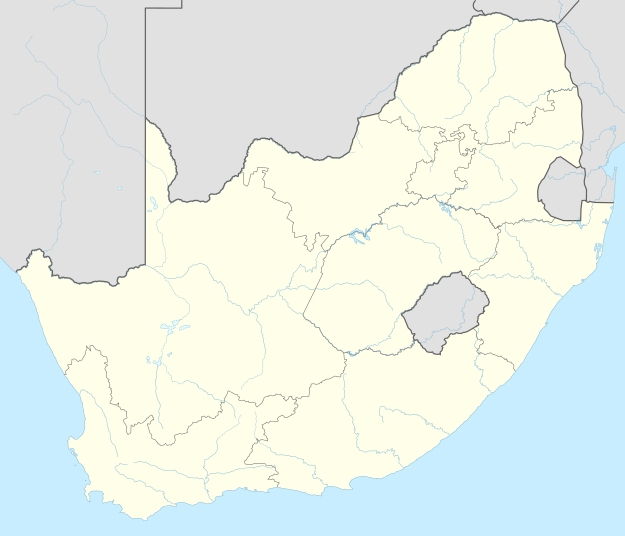Marburg, KwaZulu-Natal
Marburg is a suburb of Port Shepstone located in the Ugu District Municipality, in the KwaZulu-Natal province of South Africa[2]. Marburg was a Norwegian settlement given the name Marburg for a nearby German mission.[3] The Norwegian founders played a significant role in the development of Marburg and Port Shepstone. The British colonial government gave the settlers a free voyage to South Africa and also houses and 100 acres of land. Marburg was the only successful Scandinavian settlement in South Africa.[4]
Marburg | |
|---|---|
 Marburg  Marburg | |
| Coordinates: 30°43′S 30°23′E | |
| Country | South Africa |
| Province | KwaZulu-Natal |
| District | Ugu |
| Municipality | Ray Nkonyeni |
| Main Place | Port Shepstone |
| Area | |
| • Total | 0.38 km2 (0.15 sq mi) |
| Population (2011)[1] | |
| • Total | 1,355 |
| • Density | 3,600/km2 (9,200/sq mi) |
| Racial makeup (2011) | |
| • Black African | 9.1% |
| • Coloured | 3.4% |
| • Indian/Asian | 87.0% |
| • White | 0.1% |
| • Other | 0.4% |
| First languages (2011) | |
| • English | 88.3% |
| • Zulu | 6.1% |
| • Xhosa | 2.0% |
| • Afrikaans | 1.9% |
| • Other | 1.7% |
| Time zone | UTC+2 (SAST) |
| PO box | 4252 |
It is located west of Port Shepstone and was established in 1882 by Norwegian immigrants. It is likely named after Marburg, a city 74 km north of Frankfurt in Germany.[5]
History
Norwegian founding
The Land and Immigration Board contemplated bringing German settlers to the Marburg area in 1881, but met opposition from the German government. Consequentially, immigration agent Walter Peace suggested promoting settlement in Marburg by Norwegians. On July 20, 1882, the first Norwegians ventured aboard the steamship Lapland for their 39-day voyage from Hull, England to Mzimkulu near Port Shepstone, South Africa. Arriving in Africa on August 28, 1882, the Norwegians were brought ashore the following day.[6] The 246 Norwegians onboard Lapland were first and foremost fishermen, but slowly adjusted to the agrarian lifestyle at their 100-acre agricultural Marburg community.[7]
Many of the original 1882 founders later left Marburg, including ten families which left for Australia.[8] However, a number remained in South Africa though not all remained in Marburg. A number joined the Norwegian community in Durban, while others went to Johannesburg and other parts near Alfred County.[9]
Emigration to South Africa from Norway in 1876-85 was dominated by emigrants from Romsdal, and more specifically, from Sunnmøre.[10] Marburg's founders were first and foremost from Ålesund in Sunnmøre.[11]
When Marburg settlers celebrated their 50th anniversary in 1932, there were twenty Norwegian families left in town. 84 original settlers were still alive, and the Norwegian community had produced 208 children, 425 grandchildren, and 130 great-grandchildren.[12][13]
Geography
Marburg is located west of Port Shepstone and lies on the N2 which is probably what makes its it a strategic industrial location. Marburg is also the location where the N2 highway from Durban meets with the R61 (to Port Edward) and then turns westwards to Kokstad.
Industries
Marburg is the largest industrial node within the KwaZulu-Natal South Coast as well as the automotive hub of the region. Industries ranging in Marburg include scrapyards, panelbeaters, mechanics and motor repair centres. Other evidence of the industrialism within Marburg are the warehouses that sprawl across the area. [14]
References
- "Sub Place Marburg". Census 2011.
- "Marburg, KwaZulu-Natal - A Coastal Hub of Auto Services » SABD - The South African Business Directory". SABD - The South African Business Directory. 2019-01-10. Retrieved 2020-05-06.
- Lund, Fredrik Larsen (2017). Norske utposter. Vega forlag. Page 336. ISBN 978-82-8211-537-7.
- Kuparinen, Eero (1991). An African alternative: Nordic migration to South Africa 1815-1914. Institute of Migration. Page 112. ISBN 978-9518915457.
- "Dictionary of Southern African Place Names (Public Domain)". Human Science Research Council. p. 298.
- Du Bois, Duncan L. (2015). Sugar and Settlers: A history of the Natal South Coast, 1850-1910. African Sun Media. Page 181. ISBN 9781920382704.
- Gauld, Shelley Wood (2012). Much Bigger than Grownups: Chronicles of a Native South African. Lulu Publishing, Inc. Page 79. ISBN 9781300061700.
- Kuparinen, Eero (1991). An African alternative: Nordic migration to South Africa 1815-1914. Institute of Migration. Page 112. ISBN 978-9518915457.
- Winquist, Alan H. (1978). Scandinavians and South Africa: Their Impact on the Cultural, Social and Economic Development of Pre-1902 South Africa. A. A. Balkema. Page 104. ISBN 9780869610961.
- Kuparinen, Eero (1991). An African alternative: Nordic migration to South Africa, 1815-1914, Volume 951. Finnish Historical Society. Page 129. ISBN 9789518915457.
- Austigard, Bjørn and Nils Parelius (1994). Romsdal Sogelag Årsskrift 1994. Romsdal Sogelag. Page 9. ISBN 9788290169454.
- Lund, Fredrik Larsen (2017). Norske utposter. Vega forlag. Page 349. ISBN 978-82-8211-537-7.
- "The Norwegian Settlers Association of Marburg, South Africa". norsettler.co.za. Retrieved 2020-05-06.
- "Marburg, KwaZulu-Natal - A Coastal Hub of Auto Services » SABD - The South African Business Directory". SABD - The South African Business Directory. 2019-01-10. Retrieved 2020-06-11.
.svg.png)